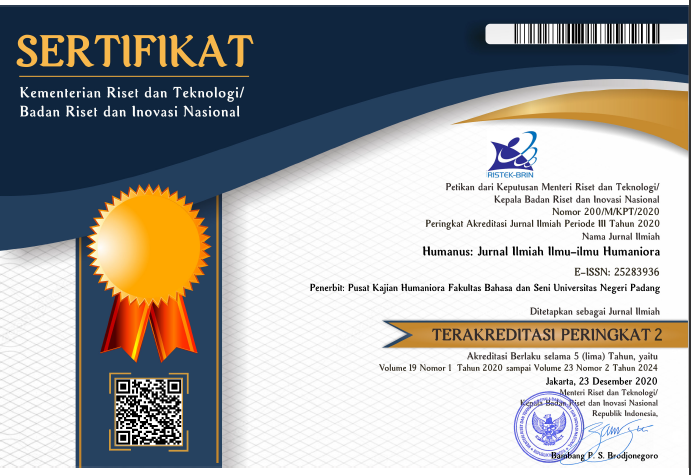Feeling the Pain Down Memory Lane: On-going Trauma in Octavia E. Buttler’s Kindred
 ),
), (1) Universitas Sebelas Maret
 Corresponding Author
Corresponding Author
Copyright (c) 2023 Zita Rarastesa
DOI : https://doi.org/10.24036/humanus.v22i2.124914
Full Text:
 Language : English
Language : English
Abstract
This paper attempts to discuss the ongoing Trauma of slavery as the collective Trauma for African American people in the US. It not only investigates the memory of Trauma experienced by the main character, Dana, in the novel Kindred but also describes how the author recalls the memory of the traumatic event and expresses it in the novel through a series of events the main character encountered. Although the traumatic event itself has long gone in the past, the memory of it still haunts the African American people through what Dana is going through. The narrative technique Butler uses in the novel is intriguing that she tells the story as some time machine where the main character can go back and forth from the setting of time, the 1970s, to the 19th-century slavery era. Furthermore, Dana experienced a physical injury that was incomprehensible for people in the 1970s to see as a result of the event that happened in the 19th-century slavery era. This can be seen as a reflection of the way African American people feel about slavery and the aftermath of it in the present. The traumatic event has passed, but the pain stays the same because ongoing racism against African American people remains.
Keywords
References
Andermahr, S. (2015-2016). “Decolonizing Trauma Studies: Trauma and Postcolonialism --Introduction. Humanities, 2.
Butler, O. E. (2018). Kindred. London: Headline Publishing Group.
Caruth, C. (1995). Trauma: Exploration in Memory. Baltimore and London: The John Hopkins University Press.
Caruth, C. (1996). Unclaimed Experience: Trauma, Narrative, and History. London: The John Hopkins University Press.
Debiec, J. (2018, September 24). Memories of Trauma are Unique Because of How Brains and Bodies Respond to Threat. Retrieved from The Conversation: https://theconversation.com/memories-of-trauma-are-unique-because-of-how-brains-and-bodies-respond-to-threat-103725
Eyerman, R. (2003). Cultural Trauma: Slavery and the Formation of African American Identity. New York, USA: Cambridge University Press (Virtual Publishing).
Kenan, R. (1991). Interview with Octavia E. Butler. Callaloo, 14(2 Spring), 495-504. Retrieved July 22, 2022, from https://speculativefictions.web.unc.edu/wp-content/uploads/sites/9624/2016/01/InterviewOctaviaButler.pdf (22/07/2022)
Mambrol, N. (2018, December 19). Literary Theory and Criticism. Retrieved from literariness.org: https://literariness.org/2018/12/19/trauma-studies/
Morrisey, T. (2021). Trauma Theory As an Approach to Analyzing Literary Texts: An Updated and Expanded Edition, with Readings. USA: Twelve Winters Press.
Varsam, M. (2014). To Remember or Not to Remember: Traumatic Memory and the Legacy of Slavery in Octavia E. Butler's Kindred and Toni Morrison's Beloved. Black Studies Papers, 1(1), 125-41.
 Article Metrics
Article Metrics
 Abstract Views : 366 times
Abstract Views : 366 times
 PDF Downloaded : 51 times
PDF Downloaded : 51 times
Refbacks
- There are currently no refbacks.
Copyright (c) 2023 Zita Rarastesa

This work is licensed under a Creative Commons Attribution-NonCommercial 4.0 International License.











